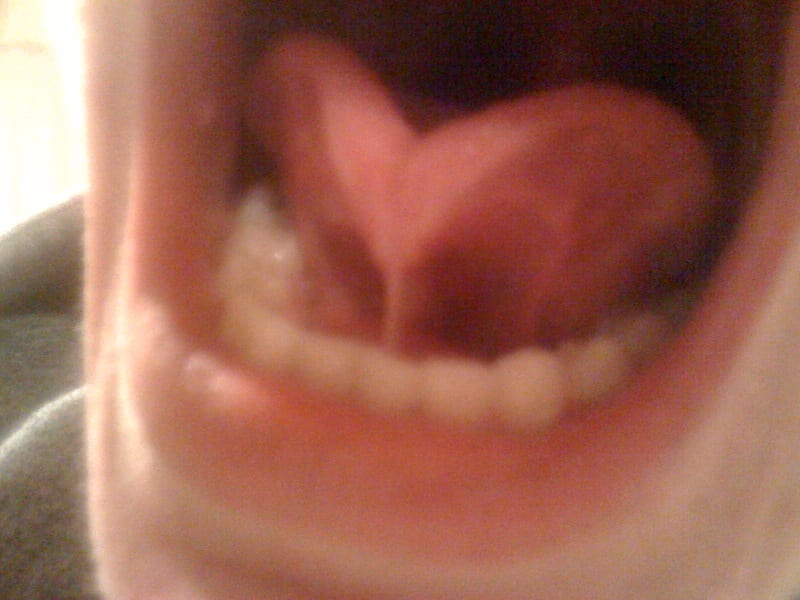 If your baby is diagnosed with tongue tie, you’ll understandably be concerned. Medically referred to as ankyloglossia, tongue tie is a condition which is present from birth and it varies significantly in severity.
If your baby is diagnosed with tongue tie, you’ll understandably be concerned. Medically referred to as ankyloglossia, tongue tie is a condition which is present from birth and it varies significantly in severity.
Here, we’ll look at what tongue tie is, what causes the condition and how it can affect both baby and you.
What Is Tongue-Tie?
When a baby is diagnosed with tongue tie, it basically means the tissue responsible for connecting the tongue to the bottom of the mouth, isn’t long enough. This in turn can cause a number of issues, depending upon the severity.
Some babies don’t experience any nasty side effects, while others can have real trouble feeding. It all depends upon the severity of the condition. Unfortunately, as the severity does vary between babies, it can be difficult to diagnose. It’s estimated around 4% to 11% of babies are born with the condition.
You’ll often be able to see for yourself whether your little one has the condition by seeing if they can fully extend the tongue. It can also present as a heart-shape at the tip of the tongue. However, it’s important not to self-diagnose your baby with tongue tie so if you do suspect they have it, get them checked over by their doctor or pediatrician.
The actual cause of tongue tie isn’t known, but it is thought to have hereditary links. It also seems to affect more baby boys than girls.
Understanding The Symptoms
The symptoms of tongue tie vary, again depending upon severity. However, the main ones to watch out for include:
Difficulty Breastfeeding – Perhaps the most concerning symptom of the condition is that it can cause problems during breastfeeding. Your baby may have trouble latching on to the breast, or they may find it difficult to suck. Tongue tie babies don’t have trouble bottle feeding however, as the nipple of the bottle is generally much easier to get milk from than the breast.
Problems With Speech – As the tongue’s tip isn’t able to rise to the top of the mouth, your little one may experience problems making specific sounds. The letters they will particularly have trouble saying properly include D, L, N, T and S.
Spaces Between The Lower Front Teeth – It’s quite common for babies with tongue tie to have spaces or gaps between the lower front teeth. This again can contribute to speech problems.
Social And Personal Issues – As baby gets older, if the condition isn’t treated and it doesn’t rectify itself, it can lead to problems with social interaction. It can unfortunately make the child an easy target for bullies for example. There’s also a few personal problems which can present themselves such as the inability for your child to clean food off their teeth with their tongue.
These are the main symptoms and as mentioned earlier, some babies don’t experience any negative side effects of the condition, while others may have all of the symptoms above. The main thing parents worry about is when tongue tie affects breastfeeding.
So, let’s look a little deeper into how it can affect feeding and what you can do to help…
How Tongue Tie Affects Breastfeeding
If baby only has mild tongue tie, it may not have any effect on their ability to breastfeed. However, if the problem is severe, it can cause serious issues which can understandably be very worrying.
It’s not actually the shape of the tongue which causes problems with feeding. It’s more a combination of the condition, along with issues in the mouth and the tongue, along with the shape and structure of the breast. Some women have more difficulty expressing enough milk, which when combined with tongue tie, can lead to serious problems breastfeeding.
One of the biggest problems that comes with tongue tie is your baby may not be able to open their mouth properly. This means they find it difficult to latch onto the breast and can instead end up chewing or sucking hard on the actual nipple. In turn, this can cause a significant amount of pain and in severe cases, cause lasting damage to the nipples.
If the nipple doesn’t elongate properly, the flow of the milk may not allow for direct swallowing. This means it could cause your baby to gag, cough, choke or vomit. If baby’s tongue tie also prevents them making a full seal around the breast while they are feeding, the milk could leak down.
Finally, mothers with tongue tie babies often report that they need to breastfeed every couple of hours. As baby won’t be getting enough milk, they’ll typically feed for longer periods, in some cases falling asleep at the breast and waking up wanting another feed. This can understandably be exhausting!
If you and baby are experiencing the above issues because of tongue tie, it could be a good idea to wean them onto the bottle. Some issues may still continue with bottle feeding, but generally it does tend to be a much easier option for tongue tie babies. However, you should seek advice from a pediatrician before making a decision.
Does It Need To Be Treated?
In most cases, tongue tie does seem to rectify itself within a year. However, in serious cases treatment may be recommended. You’ll first need to get the condition properly diagnosed by a doctor, who will be able to tell you what the best course of action would be.
Usually if it isn’t affecting feeding, tongue tie won’t necessarily need to be treated unless it doesn’t go away on its own within a year.
If baby is having issues feeding and they are under one year of age, a frenotomy may be carried out. This is where the doctor will cut the lingual frenulum after first numbing the area. It’s a really straightforward procedure and shouldn’t cause baby any pain. The wound from the cut is closed via stitches and doesn’t take long to heal.
However, the majority of the time tongue tie doesn’t need to be treated unless it is causing severe issues with feeding, or if it impacts the child later in life.
Conclusion
Overall, if you’re concerned that your baby has tongue tie and it is causing problems, don’t hesitate to contact your doctor or pediatrician. It isn’t usually something to be overly concerned about, but treatment is available if the condition is severe.
Disclaimer:
This article is for informational purposes only and should not be considered medical advice. Always consult with a doctor or licensed medical professional before making any medical decisions.
just discussing this post with a friend that as being battling this problem with her almost 2 yes baby.
it good to know that there’s is medical angle to this and not what we have been having in our heads.
she has agreed to see a doctor soon.thanks for this post.
It’s so heartwarming to learn that this article has truly convinced someone to seek medical attention for his/her child. Thank you very much for sharing this information to your friend, augusta. God bless your good heart!
We hope and pray everything turns out fine for your friend’s child.
Thankfully, my baby does not have tongue tie and I don’t have to worry about this condition. My mother says, my little sister has tongue tie. It was not only difficult to feed her, but also she had difficulty with speaking. My sister did not start to speak words until the age of three. My parents always thought that she would become mute. Thankfully, my sister’s diction became clear when he was 5 years old.
Thank God your sister gained normal speech. I believe tongue-tie could be the cause of inferiority complex in some kids. They could even be bullied for it. I am thankful none of my kids experienced this.
We hope this article would enlighten parents to seek medical attention if things are taking too long to improve for their child.
Sometimes, I wonder if it’s nature or genetic make up that causes tongue tie in babies, for one so young and tender to be suffering from such birth defects is completely worrying to me.
Definitely, I would encourage any parent that notices such on their babies to have it treated as soon as possible, because of deprivation is causes these kids from eating/breastfeeding well.
I totally agree with you, Heatman. This case should be immediately addressed because of its ill-effects on babies. It’s also very heartwrenching for any parent to see his/her baby suffering. Tongue tie can also be a cause for a child to be bullied later on in life because of possible speech defects. Treatments are available so parents should take care of this problem ASAP.
On a daily basis, I learn new thing from visiting your blog and today is not different from the others. If I had been asked what tongue tie is all about few hours ago, I would have failed the question with no clue on how to start. However, it’s nice to see how you explained everything and also recommend visiting the doctor, if the situation continue.
It’s great to come around here everyday and I must say that this is one of the blogs that have added value to my life.
Awww, thank you for the heartwarming comment, Henrywrites. We truly appreciate it.
We always strive to provide parents and parents-to-be with helpful information to better equip them with their parental responsibilities. We’ll do our best to keep coming up with more informative posts.
First and foremost, I would take time to commend the good job done in this blog community, so far it’s the best and most educative parent blog I have witnessed and participated in. They are really all wonderful. I really don’t have words to express my gratitude.
Now coming to tongue tie, my mother informed me that my immediate junior sister had such predicament at birth, she couldn’t even cry back then. It was one of the observant nurse that found out and it was taken care off.